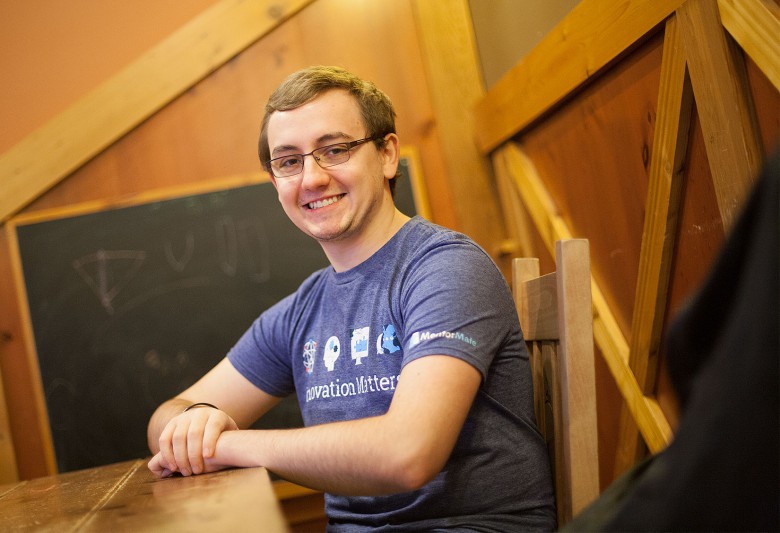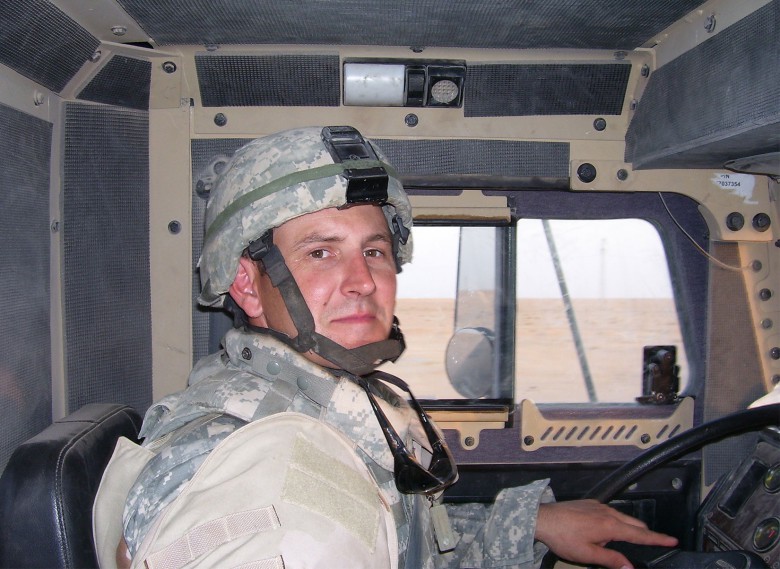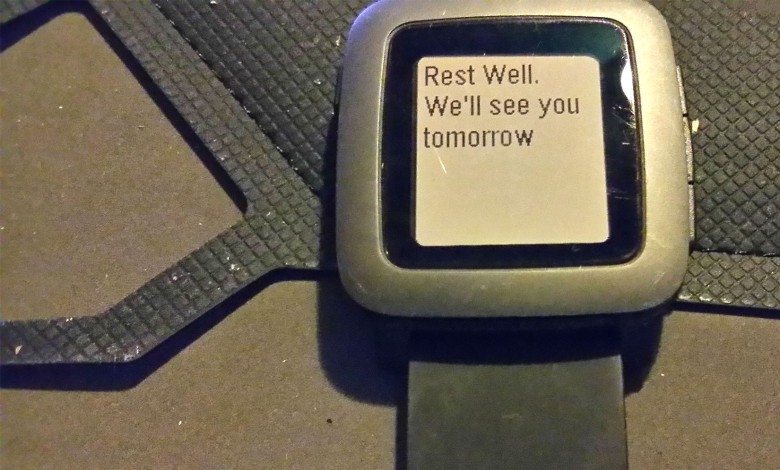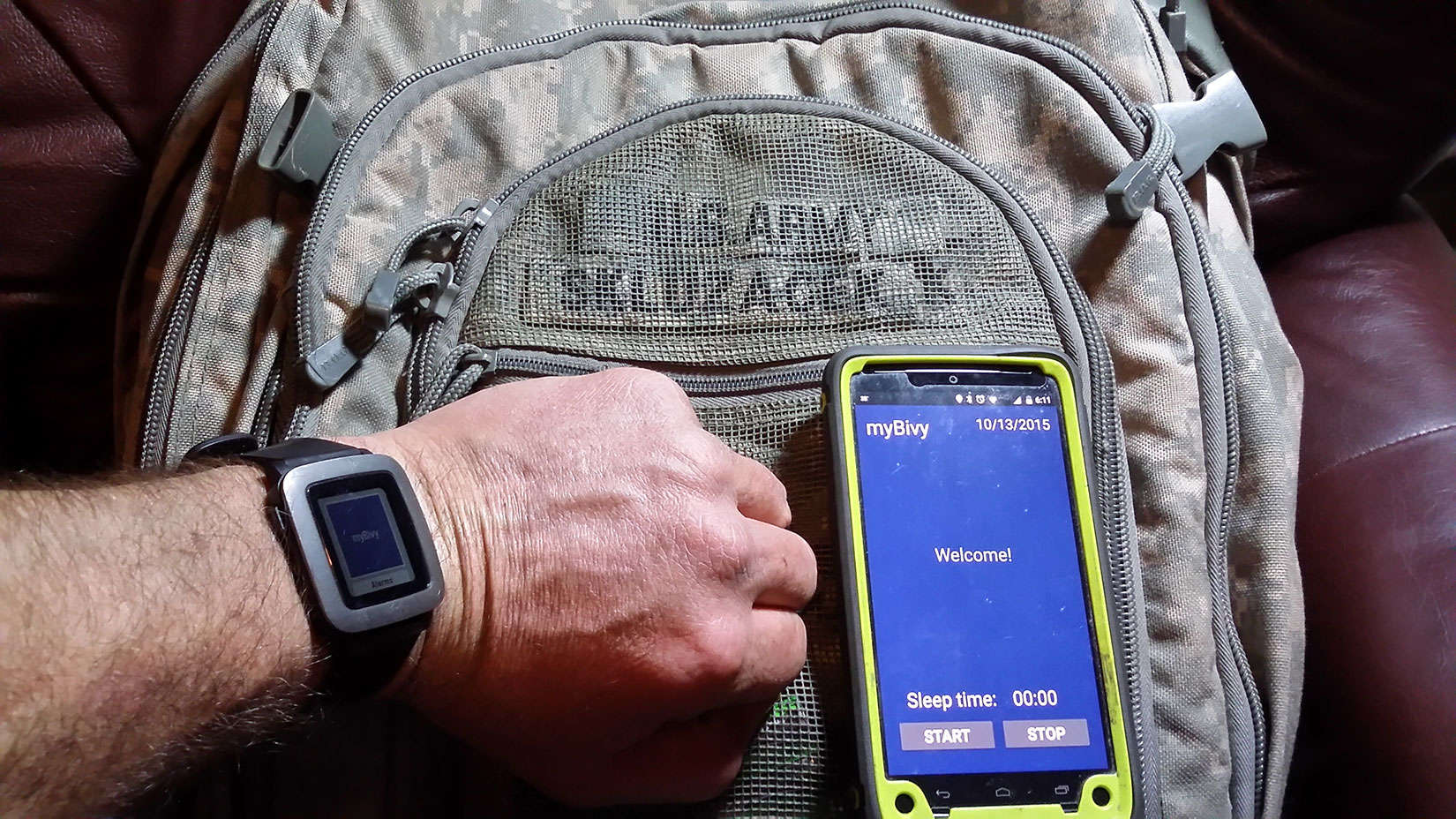Army Sgt. 1st Class Patrick Skluzacek was taking heavy fire from a relentless enemy.
He shot back with everything he had – counseling, psychiatric drugs and lots of alcohol – but felt defenseless against the post-traumatic stress disorder that followed him home to Minnesota.
He lost friends, jobs, and his marriage. But Skluzacek is reclaiming his life for the first time in the eight years since he returned from Iraq.
This is thanks to a surprise ally in his son Tyler and the weapon he invented for his father – a smartwatch app that helps him sleep.
The app still under development is called myBivy, bivy a nod to bivouac, the military term for an overnight encampment. MyBivy monitors his father’s movements and heart rate and knows exactly when a nightmare is about to set in. It then activates the watch to gently vibrate. The vibration does not wake him but it is enough to disrupt an incoming night terror as he enters deep sleep.

Photo: David Pierini/Cult of Mac
“MyBivy is like a service dog,” Tyler Skluzacek, a senior at Macalester College in St. Paul, told Cult of Mac. “Veterans with really bad PTSD go to bed with a service dog and if that person starts to get shaky, the dog will put a paw on the person exactly at the point they need it.”
Tyler has a completed version of myBivy for the Pebble Watch, is currently coding it for Android and will then tackle it for the Apple Watch so the app can be released on all smartwatch platforms at the same time, hopefully sometime this spring, he said.
There are a number of health consequences of insufficient sleep and it is a particularly challenging roadblock in the treatment of post-traumatic stress disorder because of how critical sleep is for keeping emotions on an even keel. PTSD affects close to 3 million veterans of just the Iraq and Afghanistan wars.
MyBivy will not eliminate PTSD, but its potential to help with sleep is encouraging to some within the Veteran’s Administration who treat vets with PTSD. They have been corresponding with Tyler and are interested in testing it with some of those they treat, he said.
MyBivy has also attracted interest from vets, as word has spread about its potential. Some initially wrote Tyler with great skepticism, some even lashing out that the excitement about the app is full of false hope.
Tyler has won the support of the tech community, having stood on stage at conferences. But the audience he wants most to connect with are the vets. He treads lightly.
“I made this thing and got publicity even before I could try it out on my dad,” Tyler said. “I got emails from guys basically saying, ‘you can’t be toying with our hearts. We’ve been through a lot and you’re turning us into a game.’ I’m trying to be very careful. I’m not claiming this cures PTSD but it offers a glimpse into what a good night’s sleep looks after suffering with PTSD.”
That first glimpse comes from Test Subject No. 1, his father.
Tyler was 13 when his father returned from his tour in Iraq in 2007. He was too young to understand why his father was sullen and prone to fits of anger over small things. As he got older, his mother explained in more detail how the war had changed his father.

Photo courtesy of Patrick Skluzacek
Patrick is now candid about his feelings and behavior after returning home. He said when counseling didn’t seem to help, he was given “a shopping cart full” of psychiatric drugs and when those didn’t help, he self-medicated with alcohol.
The strained relationships were not necessarily a direct result of “war problems,” as he describes the feelings. He wasn’t sleeping and was so damned tired, he couldn’t think straight.
“I started using alcohol to shut my mind off and fall asleep,” Patrick said. “It worked at first but then I needed more and that’s when it becomes a problem. I was always crabby, people pissed me off. I’d get into fights with my wife and when the cops get called, all they see is a drunk guy and his scared wife. I’m creating all this trouble and I’m just trying to sleep.”
Tyler was distant from his father, yet always held hope Patrick would find peace and eventually crawl out of the self-destructive cycles. He never thought he’d find part of the solution.
At a 36-hour hack-a-thon in Washington D.C. in September, participants were challenged to find tech solutions to help returning vets. Tyler at first proposed a social network of some kind but was quickly steered more towards coming up with ideas that would provide direct help.
Tyler began looking at sleep studies and learned night terrors routinely began as the body entered deep sleep. By the end of the event, Tyler and his team had the basic coding for an app that reported sleep patterns and a function that would power the smartwatch to intervene and stop a nightmare.
He won the top prize at HackDC and won enough money to complete a test version for the Pebble Watch.
He broke down in tears when he won because all he could think about was his father. He asked him to try the watch and he shrugged, why not. For the first 10 days, the watch just monitored Pat’s sleep patterns and sent the information to Tyler’s smartphone. From there, he could make adjustments, like the level of vibration. Too much could fully wake him.
“Going to the VA and getting another anti-depressant is more scary that wearing a watch,” Patrick said. “Within three or four days it was keeping me asleep. It was life-changing.”
His appetite returned. He has worked steady as an auto mechanic for the past few months and most importantly, has opened himself back up to the people in his life, especially Tyler.
Sleeping well for the last few months has Pat so excited, he has taken to social media, at times calling his son’s tech solution a miracle. Tyler is thrilled his father is feeling so well, but has at times asked him to dial back the enthusiasm, knowing it needs to be tested with other people.
He started a Kickstarter campaign shortly after his win at HackDC looking for a few thousand dollars to finish the app. He raised more than $26,000. In November, Tyler then went to MobDemo, a developer’s competition in Minneapolis, and won with myBivy, securing more funding plus tech and marketing support from a Twin Cities firm called MentorMate.
“Here you have a son and college senior who in 36 hours figured out a way to help his dad and maybe thousands of other veterans. This could transform PTSD outcomes,” said Tom Clemens, the executive director of Minnesota MobCon.
Clemens said myBivy has the potential to contribute more insights to the study of sleep and help people with PTSD rooted in other life traumas, such as gun violence.
For Tyler, making myBivy available to veterans can’t come soon enough. He and his father have been in conference calls with the VA, which is trying to fast-track testing of the app.
Tyler and his team have a saying: We won’t sleep until the veterans can.
He has close to 2,000 emails from veterans, all saying they want to test it. When he says he is working as fast as he can, the urgency in his voice is palpable.

Photo courtesy of Patrick Skluzacek


